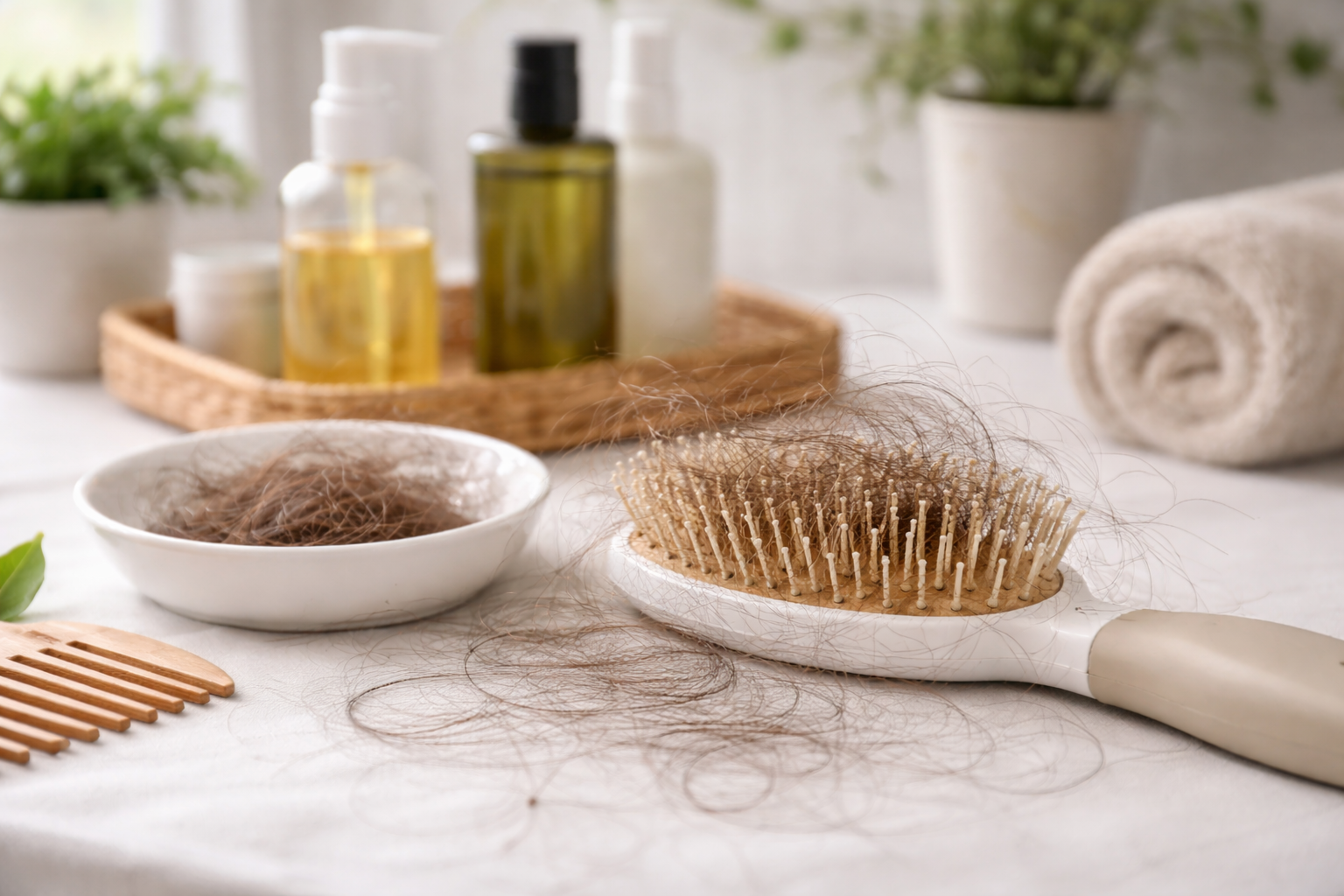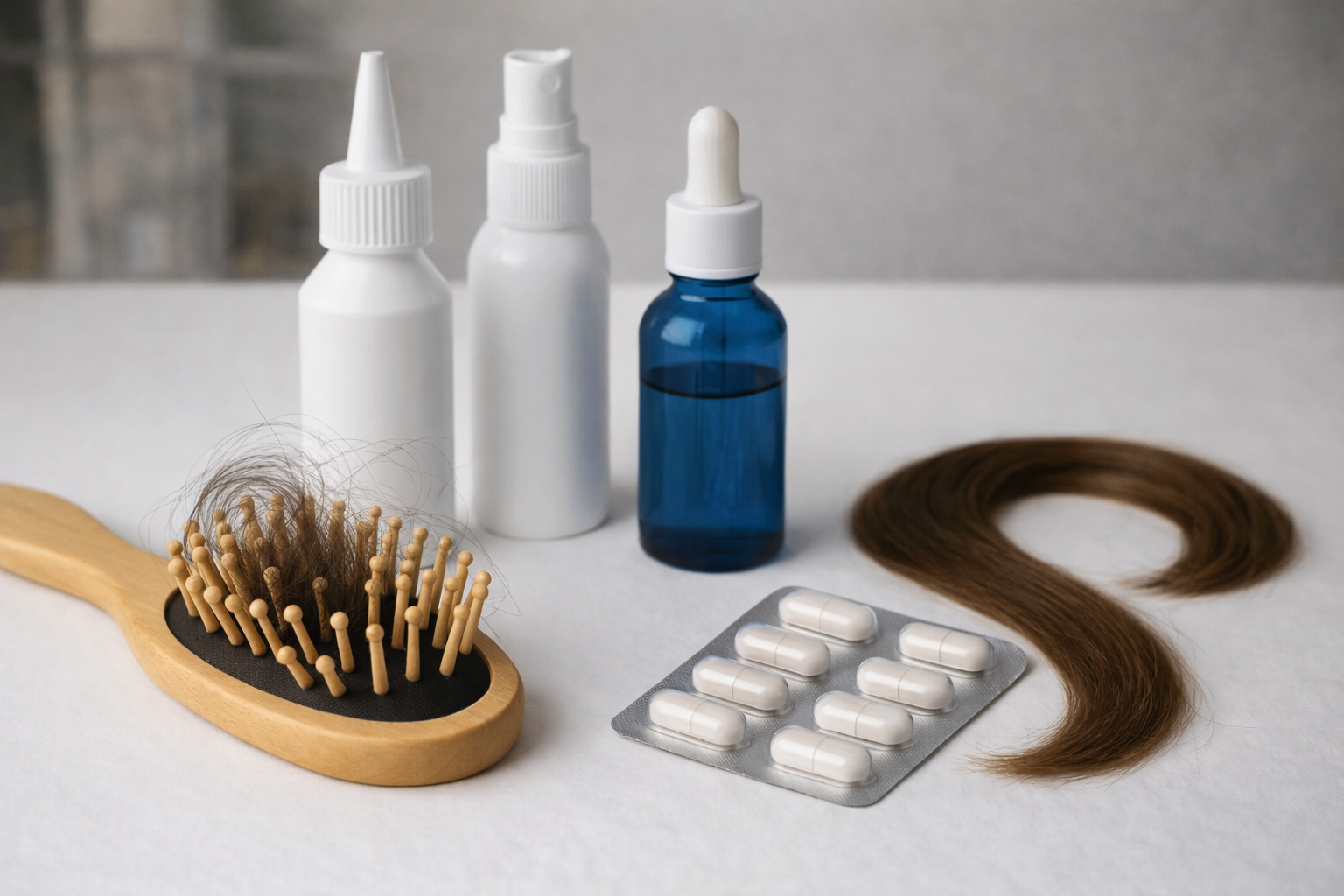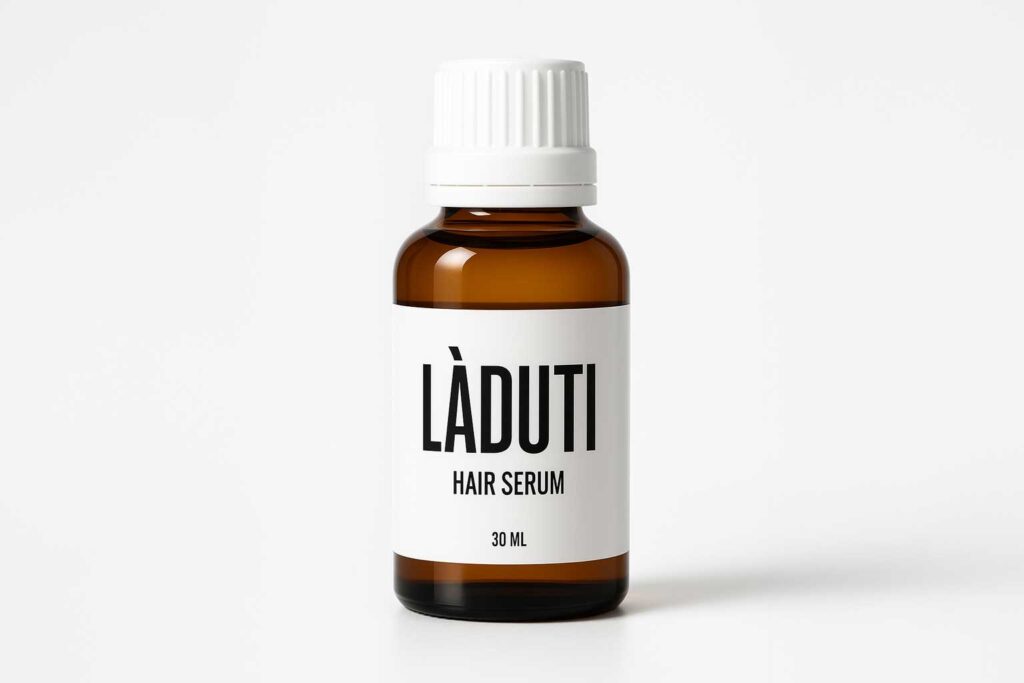Diffuse Hair Loss - What to look out for & what you can do

Diffuse hair loss describes a form of hair loss in which the hair thins out evenly over the entire head. Unlike genetic hair loss with clear patterns such as receding hairline or tonsure, there are no clearly defined bald patches. The hair appears lighter, thinner and less voluminous overall.
For those affected, diffuse hair loss is particularly distressing because the change usually occurs suddenly and can severely impact self-esteem. You can find out what you should pay special attention to and what you can do here with us.
Who is most frequently affected?
Diffuse hair loss can affect both men and women - but is more common in women. The main reasons for this are hormonal fluctuations (e.g. pregnancy, breastfeeding, menopause) and iron deficiency due to heavy menstrual bleeding.
Men
Often show uniform thinning over the entire head, especially during periods of hormonal changes.
Women
can also be affected, especially by stress, medication, infections or nutritional deficiencies. However, diffuse hair loss is often less noticeable in them, as androgenetic hair loss (receding hairline, tonsure) is usually the main cause.
1. Symptoms of Diffuse Hair Loss
Uniform thinning
In contrast to hereditary hair loss, no localized bald patches are visible. Instead, the hair becomes thinner over the entire head.
Reduced hair volume
Many sufferers first notice that braids become thinner or that the crown of the head appears wider. The hair visibly loses fullness.
Increased hair in brushes & drains
Another typical symptom is that a conspicuous amount of hair collects in the brush, in the drain or on the pillow.
Accompanying complaints
As diffuse hair loss is often caused by a lack of nutrients or hormonal imbalances, additional symptoms sometimes occur:
- Brittle nails
- Dry skin
- Tiredness or exhaustion due to a lack of nutrients
Note: Diffuse hair loss often occurs with a time delay, e.g. 2-3 months after an infection, a diet or severe stress.
2. Causes of Diffuse Hair Loss
Hormonal changes
Pregnancy & breastfeeding
Postpartum hair loss often occurs after giving birth. This is caused by the sudden drop in oestrogen levels, which ensured strong hair during pregnancy.
Menopause
A drop in oestrogen levels during the menopause also causes hair to grow back thinner and finer.
Thyroid diseases
An overactive or underactive thyroid gland has a direct effect on the metabolism of the hair follicles and can trigger diffuse hair loss.
Nutrient deficiency
Iron deficiency
One of the most common causes worldwide. Without enough iron, the hair roots cannot be adequately supplied with oxygen - the result is diffuse hair loss.
Zinc deficiency
Zinc is important for cell division and keratin formation. A deficiency weakens the structure of the hair and makes it more susceptible to breakage.
Vitamin D deficit
Vitamin D regulates the hair cycle. A deficiency, especially in the winter months, is often associated with hair loss.
Stress & lifestyle
Chronic stress
Constant stress increases cortisol, which forces the hair follicles into a premature resting phase.
Lack of sleep
Too little sleep reduces regeneration and weakens the hair structure.
Crash diets
Rapid weight loss or an unbalanced diet lead to nutrient deficiencies and weaken the hair.
Medication & diseases
Side effects of medication
Drugs such as antihypertensives, antidepressants or chemotherapeutic agents can have diffuse hair loss as a side effect.
Infections & diseases
Severe infections (e.g. flu, Covid-19) or chronic illnesses put a strain on the metabolism - hair growth is slowed down.

3. Therapy & Treatment Options
1. Investigate the causes
Medical diagnosis
A blood test at the doctor's is the most important step:
- Checking iron, vitamin D, B12, zinc and thyroid levels
- Medical history regarding medication, stress and lifestyle
Tip: The earlier the cause is identified, the better the chances of stopping hair loss.
2. Optimize Nutrient Supply
Nutrition
Eat a varied diet with plenty of fruit, vegetables, wholegrain products, sources of protein and healthy fats.
Food supplements
Supplements with iron, zinc, vitamin D or biotin can help if a deficiency is proven.
Note: Dietary supplements should be taken in a targeted manner and under medical supervision - overdoses are counterproductive.
3. Reduce stress
Exercise & Sport
Regular exercise lowers stress levels and improves blood circulation to the scalp.
Relaxation techniques
Yoga, meditation, breathing exercises or walks have a calming effect and help to stabilize the hormone balance.
Sleep quality
7-8 hours of sleep per night are essential for physical recovery and hair follicle regeneration.
4. Scalp Care
Mild shampoos
Use sulphate-free, mild shampoos that do not put additional stress on the scalp.
Scalp massages
Daily massages promote blood circulation and stimulate the supply to the hair roots.
Natural active ingredients
Products with caffeine, rosemary oil or aloe vera can stimulate the scalp and strengthen the follicles.
5. Support from Hair Serums
Procapil™ & AnaGain™
These active ingredient complexes are specially developed to prolong the hair growth phase and strengthen the follicles.
Combination with microneedling
Fine microchannels can improve the absorption of hair serums, making the active ingredients even more effective.
4. Tips & Advice for Those Affected
Seek professional help:
If hair loss is severe or persistent, be sure to consult a dermatologist or trichologist .
Be patient:
Diffuse hair loss often only improves after a few months - hair grows slowly.
Keep a diary:
Make a note of triggers such as periods of stress, infections or diets in order to better recognize correlations .
Gentle styling:
Avoid tight hairstyles, aggressive products or excessive heat styling.
Check regularly:
Repeated blood tests help to detect deficiencies in good time.
Conclusion: Understanding diffuse hair loss & treating it holistically
Diffuse hair loss can have many causes - from stress and hormonal changes to nutritional deficiencies. This makes it all the more important to specifically strengthen the scalp and supply the hair follicles with the right active ingredients.
This is precisely where the Laduti Hair Serum comes in: It combines a multitude of high-quality, natural ingredients that have been scientifically studied in relation to hair and scalp health. The following are particularly noteworthy:
- Caffeine: Stimulates the hair roots and can prolong the growth phase.
- Biotin: Supports keratin formation and contributes to stronger hair structures.
- Panax Ginseng: Promotes microcirculation and improves the supply of nutrients to the hair follicles.
- Rosemary oil: Stimulates blood circulation in the scalp and strengthens the activity of the hair roots.
- Centella Asiatica: Protects the scalp from oxidative stress and supports its regeneration.
- Procapil™: An innovative active ingredient complex of oleanolic acid, apigenin and biotinoyl-GHK, which can improve hair anchoring and counteract hormone-induced hair loss.
- AnaGain™: A plant-based active ingredient derived from pea sprouts that specifically activates the signaling pathways for hair growth and can help to extend the growth phase of the hair.
By combining these natural active ingredients and innovative complexes, our serum offers modern, gentle and long-term care that strengthens your scalp and can improve the conditions for healthy hair growth - without any dangerous side effects.

FAQ
How do I recognize diffuse hair loss?
Diffuse hair loss manifests itself as uniform hair loss over the entire head, without clearly defined bald patches.
Can diffuse hair loss disappear by itself?
Yes, if it has been triggered by stress or a temporary illness, for example. In other cases, targeted therapy is required.
Which blood values should be checked?
Iron, ferritin, vitamin D, zinc, thyroid values and hormones are particularly important for clarifying the cause.
How long does it take for the hair to recover?
As hair grows slowly, the first improvements are usually visible after 3-6 months - patience is key.
Does a Hair Serum help with diffuse hair loss?
A serum with ingredients like Procapil™ or AnaGain™, such as Laduti, can nourish the hair follicles and support the growth phase.

